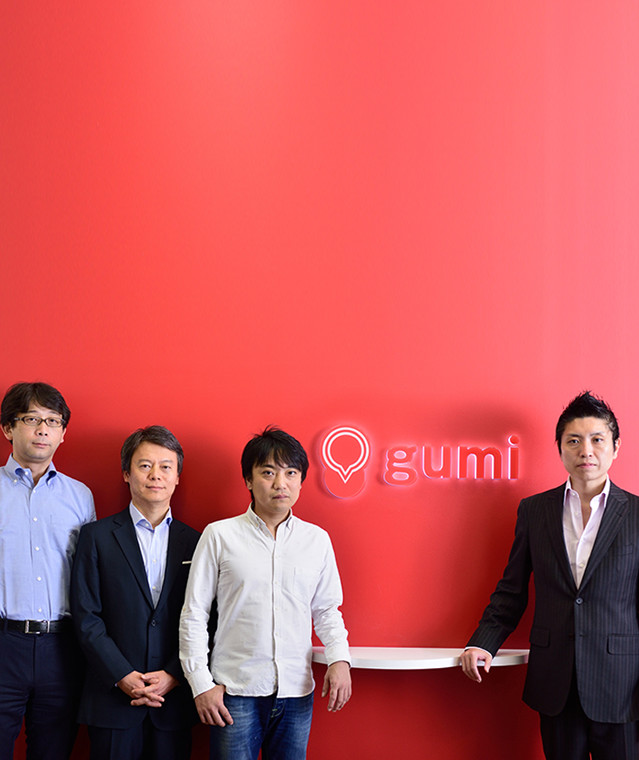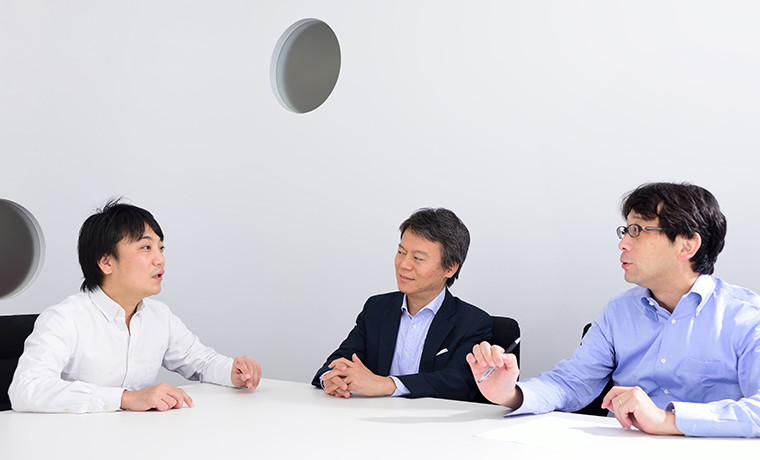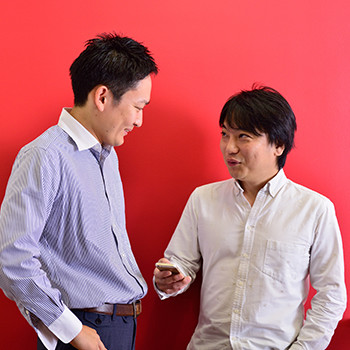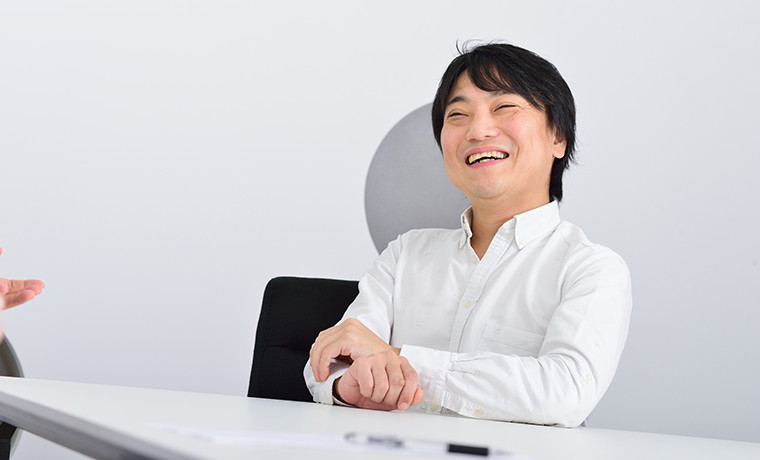Shinsei Corporate Investment interview
27th Jan. 2015
gumi ventures
Investment Strategy
gumi Inc. CEO
Hironao Kunimitsu
Mr.Manabu Nakamura, Managing Director, Head of Venture Investment SCI:Mr.Ippei Matsubara, CEO SCI:Mr.Hironao Kunimitsu Founder and CEO gumi:Mr.Hiroyuki Kawamoto, CFO gumi (left to right)

Hironao Kunimitsu
gumi Inc. CEO
Mr. Hironao Kunimitsu was born in Hyogo Prefecture, Japan, in 1974. After graduating from high school, he traveled around the world to more than 30 countries mainly in Asia and North and South America. After graduating from Santa Monica College in 2000, he joined Atmovie Inc. in 2004 where he was engaged in the movie and TV production business and was appointed as a board member in same year. . He founded gumi Inc. in 2007, and assumed the role of CEO.
gumi is involved in the planning, development and management of mobile online games, and seeks to establish itself as the world leader in the provision of smartphone mobile gaming. gumi was listed on the first section of the Tokyo
Stock Exchange on December 18th, 2014 (TYO:3903).
Investment Strategy of gumi ventures
Shinsei Corporate Investment (SCI) and gumi launched a second fund, "gumi ventures L.P. II" (hereinafter "Fund II") in August 2014, two years after starting its first fund "gumi ventures L.P." (hereinafter "Fund I"), which was jointly setup by SCI and gumi ventures Inc. (gumi ventures), gumi's wholly owned subsidiary. Fund II has successfully announced the final closing at 2 billion yen (approximately 17 million US dollars) in January, 2015. SCI interviewed Mr. Kunimitsu regarding the investment strategy of gumi ventures.
First of all, what are your ambitions for gumi ventures?
To put it simply, I would like to help accelerate innovation in Japan. Of course, I am focusing my efforts to create innovations in the mobile gaming industry through gumi, but, that is not enough. I came up with the idea of launching gumi ventures in order to incubate young entrepreneurs in Japan in order to accelerate the creation of innovations.
What kind of companies does Fund II invest in?
Our targets are companies which that provide smartphone services. As the smartphone has become a common device throughout the world, it has caused a drastic change in the entertainment industry and we believe that this change will create various new markets in the mobile industry. Similar to the mobile gaming business, which has already grown into a huge industry, we expect various smart phones services, such as video content, will be developed. I have no doubt that the use of disposable time, where people used to watch TV or read newspapers and/or magazines, will be replaced by the consumption of smartphone content. Our investment targets are the companies which provide smartphone entertainment services or related industries such as advertising.
Which stages of development would a company have to be in to be an investment target?
We are flexible on that issue. Our potential investment targets would vary from seed stage companies to later stage companies. However, we would prefer to invest in companies to which the presence of gumi ventures as a shareholder
adds value, such as enhancing overseas expansion.
Additionally, we prefer to retain the role of lead investor at each round in order to provide a full range of support to our portfolio companies.
How are you involved in Fund II?
I personally interview all investment candidates of Fund II. After this, if I feel the investment candidate has a competitive business model, market position, or management team, we conduct due diligence together with SCI and make a final investment decision at our investment committee. Additionally, I regularly hold meetings with our portfolio companies to mentor and offer advice based on my own practical management experience at gumi.
What kind of role do you play as a mentor?
I have already experienced many tasks such as funding, planning business models and strategies, recruiting, publicity, and organization structuring at each developmental stage, which entrepreneurs have to face. I've gone through the whole process at gumi so I can give appropriate advices for startups to develop as a mentor.
What kind of support do you provide to portfolio companies aside from mentoring?
We believe that we are able to add both tangible and intangible value. For example, one of the portfolio companies of Fund I has set up an office in gumi's headquarters so that we could provide hands-on support.
Specifically, our strength is that we can support efforts to expand globally after domestic expansion efforts get on track, in addition to supporting the creation of the local organization and solving business strategy matters at
initial stages.
As gumi has already expanded to Asia, Europe, and North America, we can advise how and to which country each company should expand into, as well as introduce local companies through gumi's local branch offices.
What type of startup company do you find most attractive?
Some people argue that "who" runs a startup is the most critical factor for success, but I personally think that the "market" in which it participates matters the most. I find a venture company attractive when it challenges market with high growth potential in a relatively short period of time. The emergence of smartphones and tablets PCs should spur the rise of new forms of media and entertainment, and I would like to see more startup companies challenge such new markets. Additionally, while this may be out of the scope for Fund II and be part of the next fund, I believe that the day when TVs connect to the internet will come and I am therefore keeping my eye on the "smart-TV" related industry.
What kind of entrepreneurs do you like to invest in?
Any entrepreneur who is remarkable in at least one way.
Of course, it would be ideal if he/she possesses deep understanding of their market, have a passion on business, the skills necessary to achieve his/her vision, the creativity to create content, and the networking capabilities, however,
it is extremely rare for someone to possess all these skills. I believe that it is essential for an entrepreneur to be remarkable in at least one of these areas. If they are remarkable in one area, you only have to find the appropriate
people to shore up the other factors and build a team.
For example, if a person working at a TV station who is highly skilled at video creation feels stuck and wants to attempt something new, we can match him with someone in the Internet field. I'd be more than happy to be contacted
by anyone who is remarkable in at least one thing.
What should we be expecting of the incubation program you plan to launch together with the establishment of Fund II?
Although there are some markets which I perceive are sure bets for venture companies willing to challenge them, I seldom see Japanese entrepreneurs working in these areas. I believe we can incubate a lot of successful ventures by discussing business plans with many entrepreneurs through this program. I've already been in contact with fellow entrepreneurs for support and plan to make it a unique incubation program that only gumi ventures can provide. The details of this plan will be announced soon, and I am sure it will impress.
Thank you very much.





